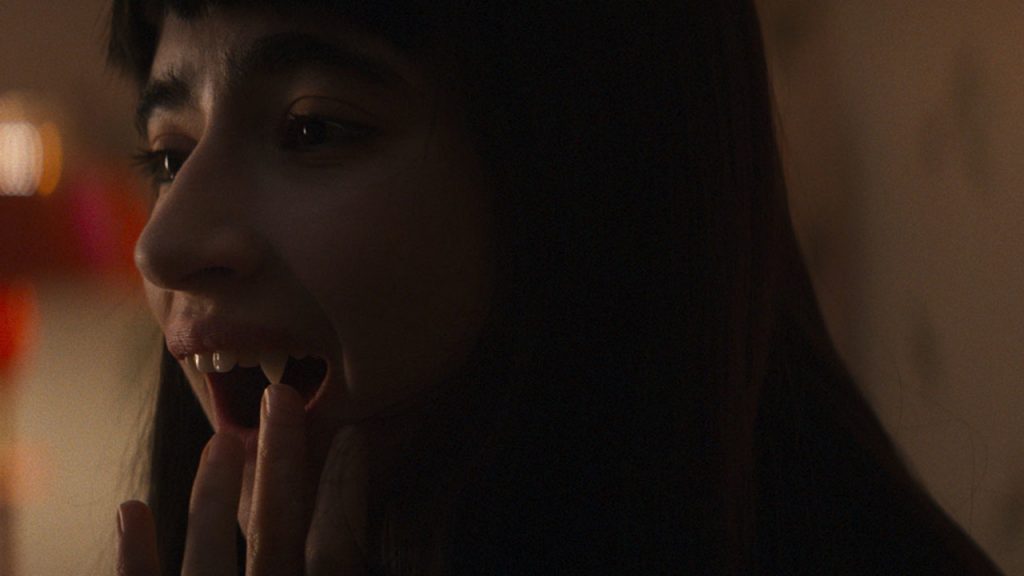Reviews include 40 Acres, Jurassic World: Rebirth, and Sorry, Baby.
TFCA Friday: Week of Oct. 13
October 13, 2023

Welcome to TFCA Friday, a weekly round-up of film reviews and articles by TFCA members.
In Release this Week
Anonymous Sister (dir. Jamie Boyle; Oct. 17)
“To the director’s credit, she managed to get a Pardu Pharmaceutical representative to speak in an interview. What she says, and how the company got their sales reps to monitor and improve sales just speaks for the companies in general on that all they want to do is make mopey,” notes Gilbert Seah at Afro Toronto.
The Conference (dir. Patrick Eklund)
“The Conference is an entertaining Swedish horror (more pure mindless fun than anything else) that should not disappoint horror fans and foreign film cineastes,” says Gilbert Seah at Afro Toronto.
Dear David (dir. John McPhail)
“Using a cobbled-together premise more unbelievable and less coherent than if the Cats movie was also pitched as a true story, Dear David disappoints in what it seems to try to do. Instead of mining a potentially interesting experience for more and deeper scares, this adaptation was apparently made expressly to get back at Ellis’s doubters — and his critics,” says Jackson Weaver at CBC. “But where Ellis’s original tweets were little more than a collage of semi-spooky observations of a settling house and the nonsensical behaviour of his cats, the project jointly produced by Lionsgate, and unsurprisingly Buzzfeed Studios, injects more of a story — both into David’s backstory, and, more tellingly, Ellis’s.”
Failure to Protect (dir. Jeremy Pion-Berlin; Oct. 17)
“Failure to Protect is an informative doc about the broken-down American Child Protective Services – more educational than thrilling, though director Pion-Berlin attempts to add some chartroom drama into the proceedings,” writes Gilbert Seah at Afro Toronto.
Foe (dir. Garth Davis)
“As in Reid’s debut novel, 2016′s I’m Thinking of Ending Things, there is a narrative-altering twist in Foe that hides in plain sight. But the film would seem to work no matter the viewer’s foreknowledge. As a reader aware of the pivot, I still found no small amount of pleasure in watching Davis and Reid snap the puzzle pieces together until the entire picture revealed itself,” says Barry Hertz at The Globe and Mail. “Foe doesn’t pretend to have the answers any more than I’m Thinking of Ending Things. But both adaptations will leave you thinking. Maybe, even, for years and years.”
“Foe is less a sci-fi film than a psychological suspense play with three characters (one or more of whom give strong clues of being deceitful). Director Garth Davis (Lion) doesn’t have a lot of variety in his mood weaving, leaning on supposed-to-be-unsettling soundtrack, and a bit too much demented laughter,” writes Jim Slotek at Original Cin. “Despite it all, Ronan and Mescal are utterly believable as a not-quite-compatible but still loving married couple, and their frustrations seem palpable.”
Humanist Vampire Seeking Consenting Suicidal Person
(dir. Ariane Louis-Seize 🇨🇦)
“Even at a trim 90 minutes, Humanist Vampire Seeks Consenting Suicidal Person wouldn’t seem to have enough to keep it going past that mouthful of a title. But Louis-Seize crafts a warm (if dark) camaraderie between these two misfits, neither of whom feels at home in the world. Paul is bullied at school; Sasha is so milquetoast, she doesn’t even have proper canine teeth,” notes Chris Knight at Original Cin. “And the director doesn’t resort to much in the way of blood, other than those baggies that Sasha so enjoys drinking. Much of the violence takes place off-screen, and whether that’s an artistic choice or a budgetary one, it’s proof that you don’t need gore to score. Humanist Vampire manages to bare its heart without baring its fangs.”
“The blood and gore though present, are toned down a notch or two in this worthy and amusing take on the teen vampire genre,” says Gilbert Seah at Afro Toronto.
“Louis-Seize doesn’t quite know where to go beyond the nifty conceit,” admits Barry Hertz at The Globe and Mail. “The script abounds with tiny, wonderful details about Sasha’s family – including how Sasha ruins one of Denise’s conquests, leaving her cousin saddled with an un-deadbeat boyfriend – but it also has an air of missed opportunities, swerving around or ignoring so many potential narrative and emotional avenues. The picture ultimately feels like a great short film ballooned to feature length for no particularly good reason perhaps other than genre flicks can be easily sold around the world these days, no matter how stretched the ambitions.”
“’X’ marks the spot between Let the Right One In and The Addams Family in Ariane Louis-Seize’s horror comedy, but the mark won’t be made by the fangs of teen vampire Sasha (Sara Montpetit, Falcon Lake). She can’t bear the thought of wantonly killing humans for nourishment so she feeds herself with bagged blood collected by her fed-up family,” notes Peter Howell at the Toronto Star. “Quebecer Louis-Seize marries adroit genre filmmaking with a charmingly offbeat sense of amour fou. The young stars are fun to watch as they negotiate love and lunchtime.”
The Mission (dir. Jesse Moss, Amanda McBaine)
“The Mission carefully avoids sympathizing with the consequences of Chau’s actions, creating a balanced accounting of his now-notorious legacy,” writes Rachel Ho at POV Magazine. “Through Chau’s story, The Mission becomes a force for our society’s knee-jerk reactions. In a time where opinions are more vocalized and polarized than ever, the film stands as an example of understanding someone’s wrong without defending or vindicating their actions, and without altogether dismissing their humanity.”
Mr. Dressup: The Magic of Make-Believe (dir. Rob McCallum 🇨🇦)
“If there are any surprises – aside from a few well-deserved sideswipes at the CBC’s funding model for children’s programming – I didn’t catch them,” notes Barry Hertz at The Globe and Mail. “This is exactly the heartwarming, lovingly constructed paean to a Canadian hero that is advertised. But don’t even dare think about programming it alongside a double bill of the 2018 doc on Coombs’s friend and colleague Fred Rogers, Won’t You Be My Neighbor? – you might not ever recover the use of your tear ducts.”
Mister Organ (dir. David Farrier)
“It’s a gripping yarn fuelled by larger than life figures and twists upon twists without making light of serious material,” says Pat Mullen at POV Magazine. “It’s also a fascinating study of a filmmaker’s recognition of the self-destructive nature of his profession as he needs to latch onto his subjects and see the story through. It says a lot about Farrier’s character, and his tenacity as a journalist and filmmaker, that he burrows through the rabbit hole and comes out the other side. Whatever hell the film was to make ensures that it’s a delight to watch.”
No Accident (dir. Kristi Jacobson)
“No Accident dives into the white supremacist movement’s growth and names names, the social media platforms on which they plotted the event to the most violent to mundane detail, and the potential threat to safety and democracy such groups continue to represent,” writes Anne Brodie at What She Said. “Leaders Richard Spencer and podcaster Christopher Cantwell show no remorse or guilt, only fury at being questioned in trial footage. The lawyers countered with far more than enough proof of their guilt from their social media, email, and text messages to one another and their followers.”
Once Upon a Star (dir. Nonzee Nimibutr)
“Reminiscent a bit of Cinema Paradiso, Once Upon a Star is a wonderful and light film, though lasting slightly over two hours depicting the love of cinema,” says Gilbert Seah at Afro Toronto.
Periodical (dir. Lina Plioplyte; US only)
“The US government claims not to have the money to address menstrual poverty, i.e. the inability to access tampons, cups, and pads or pay for medical services in what seems like a sexist patriarchal stance,” writes Anne Brodie at What She Said. “Some girls must miss school because of period pain. That too is investigated with an answer that makes sense. Men were tested with a period pain simulator and literally fell to the floor. There is so much great information, such as hope, and openness about the cycle that affects all women including menstruation and menopause. Must see for male and female audiences.”
Project Home: 3D Printing the Future (dir. Laura Waters Hinson)
“Laura Waters Hinson shows us a way to radically improve lives around the world in a permanent, cheap, sustainable, and doable way in her informative documentary Project Home: 3D Printing the Future,”writes Anne Brodie at What She Said. “It’s hard to imagine what it means to 3D print a home so Hinson lays it out with hypnotic footage of cement being squeezed like toothpaste along a programmed pattern, one row upon another, up and up.”
The Puppetman (dir. Brandon Christensen)
“Nothing really spectacular in terms of plot or different from another horror movie, except the slasher is replaced by different ways in which the puppet man strikes. Of the different killings two staged killings stand out – enough to make one flinch in terror, to the director’s credit,” writes Gilbert Seah at Afro Toronto.
The Road Dance (dir. Richie Adams)
“Even though the film plays often like a melodrama, this film still works,” writes Gilbert Seah at Afro Toronto. “The powerful film contains many powerful moments: a few that will bring out both tears and anger.”
Silver Dollar Road (dir. Raoul Peck)
“Peck constructs a riveting tale of racial injustice and the importance of practising resistance in the face of an unfair system,” notes Courtney Small at POV Magazine. “Silver Dollar Road makes it clear that every structure within the legal system, from judges to lawyers to prison institutions, has been historically designed to work against Black people. Early on in the documentary Peck notes that over the 20th century “Black Americans lost about 90% of their farmland” to white supremacy groups who terrorizes farmers and forced Black families to leave their land via acts of violence including lynching.”
Taylor Swift: The Eras Tour (dir. Sam Wrench)
“There’s so much glitter and so many lights, including the glow of thousands of cellphones held aloft, the show could probably be seen from the moon,” says Peter Howell at the Toronto Star. “It’s pure spectacle and something to behold, especially on an IMAX screen as I did. It makes Swift seems like a giant striding the Earth; a video backdrop as she performs her self-doubting recent hit ‘Anti-Hero’ has her imitating Godzilla knocking over skyscrapers.”
File Under Miscellaneous: Should we relax about the future?
Is Taylor Swift the anti-Barbenheimer? Barry Hertz at The Globe and Mail notes that the pop superstar’s Eras concert doc is a new Hollywood disruptor: “There is every good chance the doc could make more money than this season’s biggest hopeful blockbuster, Disney’s The Marvels. And Hollywood could not be more upset,” writes Hertz. “That’s because Swift and her team completely bypassed the traditional film-industry system to get The Eras Tour into theatres. Instead of working with a major studio such as Paramount or Disney or Universal – outfits with their own infrastructures, relationships with exhibitors and massive marketing departments – Swift and Co. went directly to U.S. theatre giant AMC to distribute the film, with subdistributor Variance Films booking it into other theatres.”
Ahead of the release of Killers of the Flower Moon, Peter Howell at the Toronto Star picks Martin Scorsese’s best films. Atop the list is, appropriately, Goodfellas: “Scorsese’s lifelong obsession with the Mafia and its ‘made men’ tribal rites reaches its apotheosis with this decades-spanning ensemble crime drama. The late Ray Liotta stars as Henry Hill, an impressionable (possibly delusional) young man who always wanted to be a gangster,” writes Howell. “Henry avidly takes to a life of violent crime, exciting his wife (Lorraine Bracco) as well as himself. It all comes undone when he’s arrested, jailed and prodded into breaking the Mafia ‘omerta’ (code of silence) by ratting out his chums. This can’t possibly end well, and it doesn’t, but it plays exceptionally well. Scorsese may be revisiting familiar themes of loyalty and betrayal, but he brings a fresh perspective to the family-and-friends bonding of the underworld, one to which TV’s The Sopranos owes a heavy debt.
At Original Cin, Chris Knight speaks with Relax, I’m from the Future director Luke Higginson about casting Kiwi Rhys Darby as the lead and adapting a popular short into a feature film: “It just struck a chord, and people liked it,” he recalls [of the short]. “And a bunch of people were like, ‘I want to see a longer version of this.’ But it was a slow process, because it did start as a sort of one-joke short.” (If you see the film — and you should! — the short was basically the scene on the rooftop, between a time traveller and a suicidal artist,)” writes Knight. “A person from the future with no plan was funny to me,” Higginson says. “But it’s hard to build an arc around that because it’s very easy for it to just get boring. So that was actually surprisingly difficult to crack.”
A Festival of Festival Coverage: Festober Feels the Crunch
At The Globe and Mail, Barry Hertz looks at the challenges faced by Toronto festivals like imagineNATIVE and Reel Asian, which are struggling financially amid inflation costs and reductions in funds from both public and private bodies: “This is the first year in my time here where I’ve had the funds we expect to get not come through, or come in reduced,” imagineNATIVE executive director Naomi Johnson tells Hertz. “It’s like that for most not-for-profits, all compounded by inflation and the cost of being in Toronto. It’s insanity to try to keep up with these expenses, particularly for hotels. Our average last year was $189 a night. This year it’s $350.”
At Original Cin, Liam Lacey helps readers navigate the sheer volume of festival options this month. Highlights include Liz Marshall’s s-yéw-yáw/Awaken at Planet in Focus. “Filmmaker Liz Marshall collaborated with British Columbia-based First Nations artists and cultural activists, Ecko Aleck, Alfonso Salinas, and Charlene SanJenko, in documenting how traditional cultural teachings and ceremonies – including songs and drumming – can be used to heal and educate,” writes Lacey. “The lofty goal is to forge bonds between generations while restoring a traditional respect for the land and nature. Very much a team effort, the film emphasizes that film-making itself is part of the cultural work.”
At Classical FM, Marc Glassman offers highlights from Planet in Focus, including Cabin Music, directed by and starring James Carson: “Cabin Music is a beautiful film, truly exploratory and poetic. The music is wonderfully evocative of inner and outer states of being, which approach bliss. It is a one-of-a-kind experience, unusual for Planet in Focus and certainly worthy of being seen and enjoyed.”
At That Shelf, Rachel West offers five picks for imagineNATIVE including Inky Pinky Ponky: “Set to an upbeat soundtrack and a queen bee that rivals Mean Girls’ Regina George, directors Damon Fepulea’i and Ramon Te Wake’s film is full of pain, joy, and ultimately, hope,” writes West. “Faletau-Prescott is absolute dynamite, and as Lisa would say, she came to slay. The only disappointing thing about Inky Pinky Ponky is that it’s only 85 minutes. When the credits roll, you’ll wish you had more time with these characters.”
TV Talk/Series Stuff
At Exclaim!, Rachel Ho speaks with Bria Mack Gets a Life’s Kelly Fyffe-Marshall and Sasha Leigh Henry about getting their new series off the ground: “Ryan Cavan [co-writer of Slash/Back] once said, as a writer — but I think this applies to all art — your job is to figure out what’s been said, how recently has it been said, who said it, does it bear repeating, and who does it bear repeating by,” Henry tells Ho. “I tried to keep that in mind. Bria is asking of a young Black woman who might have experienced all of these things, or gone to a predominantly white institution, what comes after? There are echoes from the centre zone that a lot of the marginalized storytelling is focused on. [Bria] has remnants of that, but it’s taking us to a new place, a new direction.”
At What She Said, Anne Brodie dives into the mini-series Payback: “Four hour-long pulse-pounders are as taut as it gets (thank you Jed!) taking Lexi on a terrifying journey that defies preconceptions, and calls on everything she has to survive with secret help from a detective she’s never met, ending with a major twist,” she notes. “Absolutely riveting.” Meanwhile, fellow mini-series The Sixth Commandment is equally gripping: “with an artful script, pacing, and that it leaves us to use our imagination, it is both disturbing and challenging,” writes Brodie.
At Original Cin, Liam Lacey offers notes on Lessons in Chemistry: “While the tone is unabashedly preachy, it’s also fun, including Elizabeth’s forward-thinking wisdom and pedantic cooking instructions (‘Baking powder is an alkali which will raise the PH levels of your chicken skin…’),” writes Lacey. “It’s too bad that the charm of the first episodes begins to wear off as the series takes on more narrative baggage. In contrast to Elizabeth’s insistence on a pristine, efficient workplace, the scripts seem unable to throw anything out, including the novel’s most sentimental and melodramatic excesses.”



